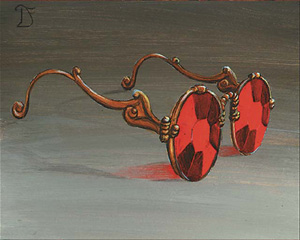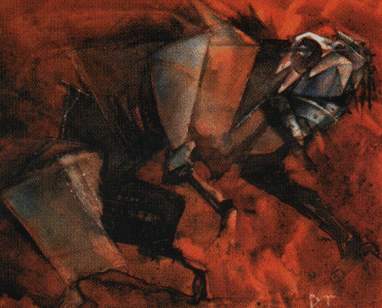People like to slam the PPTQ system. They have plenty of valid criticisms. A two-tiered Pro Tour qualification system is obviously more difficult to overcome, on average, than the old single-tiered system. Cramming forty people into a local store is less cushy than sharing a rented tournament space with 150 of your closest frenemies. Winning five packs for making top eight feels bad. All true.
Here’s the thing: everything is bad if you focus on it. You know how pleasant it was to meet Hunter at Kellogg’s Diner at 7:00 am to drive an hour to some ill-equipped Elks lodge in central New Jersey? It was not pleasant. There is always something that could be better. Plenty of great experiences trigger anxiety—graduation, child birth, making your first top eight, skydiving, whatever.
Fixating on why something is bad is easy and boring. You don’t have to know much about what you’re criticizing. Back in music school, I joked with my buddy Rahsaan that you could write a list of common performance criticisms, bring it to our studio class, and pick one or two at random to evaluate every colleague who played for the class. You know what will be wrong, and it doesn’t really matter whether that error manifested itself in the iteration your were supposed to be listening to. I did not do this, because it’s lazy and disrespectful, but I’m sure plenty of others did. And why not? What if you don’t even know what’s wrong, but you are called upon to criticize? Say something that is probably a valid criticism.
Criticism is important. But if everyone is on the negative side of some random part of your life, like the PPTQ system, there’s going to be value in taking the positive view. When everyone else zigs, you zag. I love the PPTQ.
Playing Magic is fun. I love tournaments. PTQs were fun, and living in New York made them reasonably common. But the PPTQ system here in Denver is fantastic. There’s one or two almost every weekend. I wish more were sealed, but we have enough, and the constructed ones are fun too. The stakes are low enough and the fields small enough that they don’t consume your entire day physically and emotionally, unless you do really well. I don’t scrub out of many PPTQs, but when I do, it feels like a free day rather than a missed opportunity.
Lower stakes encourage more risk-taking as well. When I travel to a grand prix, I want to maximize my performance. I don’t want to “try something new” unless I have no better choice. But taking a new deck to a PPTQ, or improvising a new strategy in sealed, is a lot easier in a smaller five or six round tournament. I learned a lot grinding PTQs, but I think I get more intellectual value out of PPTQs.
You get to spend a weekend day playing Magic with your friends, and the rest of the local grinders. The crowd varies from week to week, but you get to know people from around your area if you travel to most of the PPTQs. It’s also a nice way to test out various stores to find the one with the best vibe. You can do that anyway, but it’s nice to have an organized circuit that lets you do this without having to plan much.
If you don’t have a lot of local stores, or most of them are disappointing, then I can see disliking PPTQs. Magic can be a cliquish game, though. Forcing different play groups to mix hopefully leads to raising standards everywhere, bridging social divides along the way. We’re still in the early years of the PPTQ system—I expect them to get progressively better over time.
Last weekend, I drove an hour to Loveland, Colorado for a Shadows sealed PPTQ. Traffic was annoying and the store was cramped. The weather was unexpectedly cold. I had every reason to be grouchy, and at first I was. But then the magic took over, and I had a great time. My sealed pool was above average but not great. The field was full of good players. It was a nice challenge. While I lost the last round to finish tenth, winning only three packs, I still loved it. As a bonus, I’m still eligible to play in the two Eternal Masters sealed PPTQs some stores are hosting next month!
Here’s the deck I built. It has a lot of good cards, but many holes.
The Uncommons
I never lost a long game, and only lost once after flipping [casthaven]Duskwatch Recruiter[/casthaven] on curve. I fell short against a friend who tempoed me out—with a deck that he also somehow managed to draw one match and win another match 1-0. And I lost my win-and-in to a great player with a better deck. I made two misplays in the final round—misordering attackers on my [casthaven]Watcher in the Web[/casthaven], then forgetting to count the point of lifegain from killing [casthaven]Pious Evangel[/casthaven] when choosing my final line. That was rough, but I saw it all and instantly understood why I made those mistakes and how to avoid them in the future. Live and learn, for real.
Some day I’ll win a PPTQ. But even if I don’t, I love going to them. And I’m sure they are helping me get closer to requalifying for the pro tour through a grand prix, even if I never get to a regional. Call me a fan.
Carrie O’Hara is Editor-in-Chief of Hipsters of the Coast.



